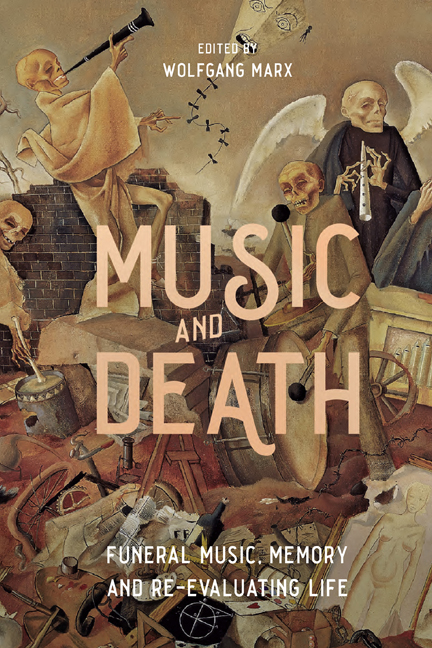Introduction
Published online by Cambridge University Press: 12 January 2024
Summary
Death is one of the crucial elements of the human condition; its inevitability as well as the uncertainty of its time of arrival are a defining component of life. According to Heidegger, our existence is shaped by a constant state of anticipation: an awareness of, and worrying about, the finality of our current state of being and whatever may follow it.
Music has always played an important part in humankind's engagement with death; it forms a central part of death rituals in different cultures and helps to console survivors, as well as celebrating the memory of the deceased. Yet it can serve an even broader function through its very existence. In an overview of psychological studies regarding the role of music in mitigating death anxiety, Audrey Berger Cardany states that ‘music transforms our perceptual and sensory experience of time and thereby serves defensive or coping functions during the process of mourning’. She adds that ‘music may aid in denying death by providing a sensation without bodily reminders’ – given that it is the (usually) gradual deterioration of our body that eventually causes death, this can serve as a welcome ‘distraction’.
In his essay ‘“Universal” Music and the Case of Death’, Philip Tagg outlines some fundamental questions regarding the relationship of music and death. He suggests that Western listeners commonly associate the following five attributes with what he calls ‘funereal’ music:
• minor key,
• low volume,
• slow tempo,
• restricted ambitus and short, repetitive phrases,
• low tessitura and descending movement.
These attributes were compiled as a result of a small empirical test undertaken by Tagg with Western listeners. However, the same listeners proved unable to recognise musical responses to death from non-Western cultures, as those pieces were not dominated by the five attributes listed above. From this Tagg concluded
that death or music or both must be treated as culturally specific and not as universal phenomena. However, it still holds true (a) that all societies have music and (b) that all mortals die.
- Type
- Chapter
- Information
- Music and DeathFuneral Music, Memory and Re-Evaluating Life, pp. 1 - 8Publisher: Boydell & BrewerPrint publication year: 2023



